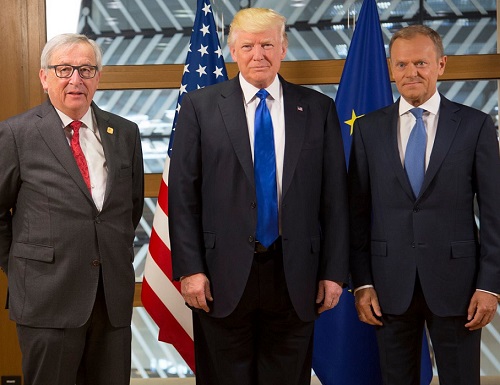
After last weekend’s G-7 and NATO summits, leading figures would have the world believe that transatlantic relations are rougher than ever, literally as well as figuratively. The media have highlighted such ephemera as President Trump’s allegedly pushing the prime minister of Montenegro and his white-knuckle handshake with French President Emmanuel Macron. European politicians, however, speak in starker tones about the twin threats of a Trump presidency and an impending Brexit.
German Chancellor Angela Merkel announced her despair at a campaign rally in a Munich beer hall on Sunday. “The times in which we could rely fully on others, they are somewhat over,” she said. While she remains a “convinced transatlanticist,” she said the time has come that “we must fight for our future on our own, for our destiny as Europeans.”
The proximate cause of her grief was Trump’s potentially pulling out of the Paris climate agreement, which Merkel deemed “a central agreement for shaping globalization.”
Such is its significance that Donald Tusk, president of the European Council, would instruct the United States to focus on “values … not just interests.” Italian Prime Minister Paolo Gentiloni then extolled “fundamental principles, such as our commitment to fight climate change.”
No one exceeded Merkel’s rival for the chancellorship, Social Democratic Party leader Martin Schulz, who said that the present U.S. administration had become “the destroyer of all Western values.”
“Europe is the answer,” Schultz offered. “Stronger cooperation among the European countries at all levels is the answer to Donald Trump.”
Eurocrats have consistently invoked a vision of an “ever-closer union,” ever more firmly consolidated under their control in Brussels. But in the context of the EU, “centralization means a lack of democracy,” as Tomasz Poreba, a Member of European Parliament from Poland, said at the first Conservatives International – Americas conference in Miami over the weekend. The more remote the level of governance, the less any individual can influence it and the greater it is subject to cronyism.
Furthermore, reticence about the Paris climate agreement is well-founded and shared by many Eastern European nations behind the scenes. In order to meet its targets, the price of emitting carbon dioxide would have to rise by 1,000 percent in Europe. “To the extent the Paris accord increases political control over human and natural resources, it will make the world poorer and technological progress less likely,” the Wall Street Journal has warned.
It is far from clear that empowering supranational governing bodies and increasing the price of energy are bedrock transatlantic values.
Still, Merkel told the Munich crowd that, inside the G-7 meeting in Sicily, support for the Paris agreement ran “six – if you count the European Union, seven – against one.” It is precisely this assertion that the EU – led by four nations already represented in the G-7 Summit – is a co-equal and independent entity that the United States and a growing number of Euroskeptics are unwilling to tolerate.
This is especially true when many of those insisting the United States adhere to modern secular progressive “values” have not upheld their promise to adequately contribute to NATO. Only five of NATO’s 28 members meet their obligation to spend two percent of their GDP on defense. If every nation had done so, it would have amounted to $119 billion last year alone, President Trump said in Brussels.
The United States is doing Europe no favors by alleviating the continent’s need to pay for its own defense. Indications are funds that otherwise would have gone to defense – a core function for which governments are instituted among men – instead go to fund the EU’s generous welfare state. Such programs, Pope John Paul II wrote in Centesimus Annus, lead to “a loss of human energies and an inordinate increase of public agencies, which are dominated more by bureaucratic ways of thinking than by concern for serving their clients.”
That is by no means to say that there are no failings in Washington, D.C. On Tuesday, President Trump tweeted that the “MASSIVE trade deficit with Germany…will change.” A potential trade war with Germany would, indeed, create a gulf within the transatlantic alliance.
However, urging leaders to fund central government responsibilities and avoid costly agreements that sap energy (both human and natural) does nothing to harm “Europe.” Such principles are valid for every nation. The current rift is not between the United States and “Europe” but between the U.S. and the EU superstructure. And Brussels’ agenda already faces serious opposition from its own 28 (soon to be 27) member states.
At some point, the EU must implement policies that stimulate economic growth and development, and allow more breathing room within its “ever-closer union,” or it will speak to an ever-smaller – and ever-poorer – constituency.
(Photo: President Donald Trump flanked by European Council President Donald Tusk, left, and European Commission President Jean-Claude Juncker, right. Photo credit: Shealah Craighead, the White House. Public domain.)

